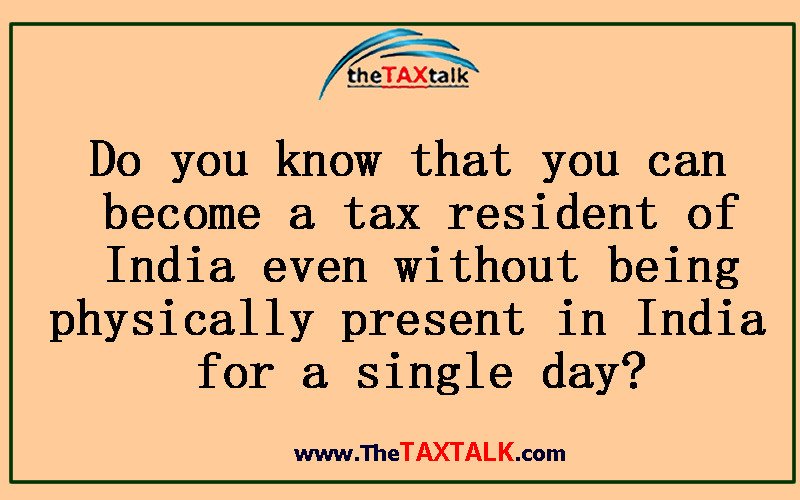![]()
Do you know that you can become a tax resident of India even without being physically present in India for a single day?
Author
Balwant Jain
You are treated as resident of any country for tax purposes if you have been physically present in that country for a minimum specified period. The same rules apply in India as well. However, the law was amended in 2020 to make you resident of India even if you were not physically in India even for a single day. Let us discuss the existing provisions, reason for this amendment, the amended provisions and its implications.
When one becomes a resident of India on the basis of his physical stay in India
Your residential status for a year is determined based on your physical stay in the year for which income is to be taxed. For becoming a resident in India, one has to satisfy any of the two conditions. Generally, a person is treated as resident of India if he has been physically present in India for 182 days or more in the that year. Alternatively, you can also be treated as resident even if you were not present here in India for 182 days or more but were present only for 60 days or more in that year and were physically present in India for a minimum period of 365 days in four years preceding that year. However, the Indian citizens who leave India working on a ship as crew member or leave India to take up an employment India will not become by virtue of the second condition and they will become resident only if they have been in India for 182 days or more even if they have been here for more than 365 days in preceding four years. The second condition will also not apply to persons of Indian origin who come to India on visits. A person who does not satisfy the above conditions become non-resident for tax purposes. There is one more category of resident but not ordinary resident if he has been non-resident for nine out of ten years or has been in India for 729 days or more during his preceding seven years preceding the relevant year.
Reasons for the amendment of the residency rules
Certain high net worth Individuals used to manage their physical stay in different countries in such a way that they were not treated resident of any country for tax purposes and were able to evade tax on the income accruing to them in India or income which would accrue them due to Indian source connection. The amendment was brought in to plug such practices which deprived India of its legitimate tax dues.
The amended provision which makes an Indian Citizen tax resident without being in India for tax purposes.
Generally, citizenship of a person is not relevant for determining the residential status of an Individual but the amended law intends to make all Indian Citizens tax resident of India satisfying certain conditions even if they otherwise are not resident of India based on their physical presence criteria. A person is an Indian citizen if he holds an Indian passport. So the person though called Non Resident Indians (NRI) and do not hold Indian citizenship are not covered by this amendment.
Under the new provisions an Indian citizen will be treated as resident for tax purpose even if he does not satisfy the conditions of his physical stay in India if his total income in India and from Indian sources exceed fifteen lakh rupees during the year and he is not liable to pay tax in any other country based on based on the criteria of his physical stay or domicile etc. The Indian citizen who becomes a resident of India by virtue of the above provisions will not become a full resident making liable to pay tax on his global income but will only become a resident but not ordinary resident of India. The new provisions have already become applicable from the financial year 2020-2021 for which the income tax returns have to be filed by 31st December, 2021.
Implications when you become a resident even without being in India for a single day
Since the income are taxed on the basis of source of such income as well as residential status of a person. Income of a country gets taxed in the source country. Since such persons are not full-fledged resident of India, they will not be eligible to avail the benefits under Double Tax Avoidance Agreement (DTAA) entered into by India with other countries. However, in case such person has already paid tax on his income outside India can claim credit for such taxes paid to the extent of his tax liability in respect of the such income again getting taxed in India.
Balwant Jain is a tax and investments expert and can be reached on jainbalwant@gmail.com and @jainbalwant on twitter


